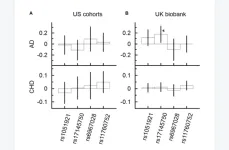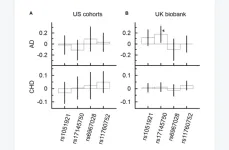(Press-News.org) EL PASO, Texas (May 24, 2023) – Researchers at The University of Texas at El Paso have successfully mapped specific regions in the brain that are activated in association with changes in blood sugar — also known as glucose — providing fundamental location information that could ultimately lead to more targeted therapies for people who struggle with conditions like diabetes.
The landmark 13-year study, published in the Journal of Clinical Medicine, describes how the team used careful microscopic analysis to pinpoint specific cell populations in the brain that appear responsive to rapid changes in blood sugar.
Arshad M. Khan, Ph.D., UTEP associate professor in biological sciences, and a team from his laboratory, led by doctoral student Geronimo Tapia, spent the past decade continuing work first performed by student researchers at the University of Southern California (USC), where Khan worked prior to joining the faculty at UTEP. Together with the help of two additional team members – UTEP Research Assistant Professor Sivasai Balivada, Ph.D., and USC’s Richard H. Thompson, Ph.D. – the team discovered what they believe may be glucose-sensitive cell populations in the brain and carefully mapped their locations in an open-access brain atlas.
The results of the study represent a significant step toward uniform global brain mapping and the evaluation of cellular responses to blood sugar in diabetic patients, Khan explained.
“I am grateful to all my contributors' hard work throughout the years, both when I was at USC and now here at UTEP,” Khan said. “Finally knowing the exact coordinates for these structures in an open-access brain atlas means this spatial knowledge can now be utilized by the scientific community for the refined targeting of future clinical or therapeutic interventions for individuals experiencing blood sugar fluctuations and prediabetes.”
Khan added, “Finding these cells is a bit like monitoring the fuel sensors in a car when its fuel levels rise or fall. The next step will be to find the wiring that connects these sensors to other parts of the brain, a task for which we are already hard at work.”
Khan’s team was able to track blood sugar changes in responsive regions of the brain in 15 minutes, a process that previously took hours due to limitations in the biomarkers used to detect these changes.
The locus coeruleus (Latin for "blue place") — a brain region so named because of its unique tissue color — produces norepinephrine, a neurotransmitter that plays an important role in arousal, attention and the body’s stress response. In the study, the locus coeruleus was found to be one of the few regions responsive early on during the blood sugar changes, suggesting it is an important arousal center for individuals with Type I and Type II diabetes when they experience life-threatening alterations in their blood sugar. Such alterations often occur when diabetics self-inject insulin, a hormone treatment which normalizes their high blood sugar levels, but which can also send them to dangerously low levels if incorrectly dosed.
The new knowledge of that region of the brain could ultimately help researchers monitor and intervene during the most dangerous effects of variations in blood sugar that arise as a common complication of diabetes management.
“This research is very important in our border region because there is a high prevalence of obesity and diabetes in our communities,” said Jessica Salcido Padilla, a UTEP graduate student from the Khan lab and study co-author. “Our goal is to identify exactly where certain processes happen in the brain so we can develop therapies, technologies or pharmaceuticals that help.”
Khan’s research was supported by three grants from the National Institutes of Health (NIH) and by funds and imaging facilities available from UTEP's Border Biomedical Research Center, which focuses on biomedical research relevant to the Paso del Norte region. The NIH funds included resources for microscopic imaging and analysis, mapping software and computational tools used by graduate student research assistants and research staff, and tuition support for students that produced the data for this study.
“This important work by Dr. Khan and his team exemplifies our college’s – and our University’s – commitment to the advancement of discovery of public value,” said Robert Kirken, Ph.D., dean of the UTEP College of Science. “I sincerely congratulate them on the fruitful conclusion of their study, and I am hopeful and enthusiastic about the clinical therapies their findings will enable.”
About The University of Texas at El Paso
The University of Texas at El Paso is America’s leading Hispanic-serving University. Located at the westernmost tip of Texas, where three states and two countries converge along the Rio Grande, 84% of our 24,000 students are Hispanic, and half are the first in their families to go to college. UTEP offers 169 bachelor’s, master’s, and doctoral degree programs at the only open-access, top-tier research university in America.
END
Researchers map the brain during blood sugar changes
Brain regions mapped to aid future diabetes therapies and studies
2023-05-24
ELSE PRESS RELEASES FROM THIS DATE:
External factors shape genetic predisposition to lipids, Alzheimer’s and heart disease in MLXIPL gene
2023-05-24
“Recent findings suggest that neurodegenerative and cardiovascular diseases may have overlapping etiologies [...]”
BUFFALO, NY- May 24, 2023 – A new research paper was published in Aging (listed by MEDLINE/PubMed as "Aging (Albany NY)" and "Aging-US" by Web of Science) Volume 15, Issue 9, entitled, “Exogenous exposures shape genetic predisposition to lipids, Alzheimer’s, and coronary heart disease in the MLXIPL gene locus.”
In this new study, researchers Yury Loika, Elena Loiko, Fan ...
A student’s poor eating habits can lead to a lifetime of illness
2023-05-24
A UBC Okanagan researcher is cautioning that a person’s poor eating habits established during post-secondary studies can contribute to future health issues including obesity, respiratory illnesses and depression.
Dr. Joan Bottorff, a Professor with UBCO’s School of Nursing, is one of several international researchers who published a multi-site study looking at the eating habits of university students. Almost 12,000 medical students from 31 universities in China participated in the study that aimed to determine the association between eating behaviours, obesity and various diseases.
The point, ...
Recent UCLA computer grad constructs “Crown Jewel of Cryptography”
2023-05-24
ACM, the Association for Computing Machinery, today announced that Aayush Jain receives the 2022 ACM Doctoral Dissertation Award for his dissertation “Indistinguishability Obfuscation from Well-Studied Assumptions,” which established the feasibility of mathematically rigorous software obfuscation from well-studied hardness conjectures.
The central goal of software obfuscation is to transform source code to make it unintelligible without altering what it computes. Additional conditions may be added, such as requiring the transformed code to perform ...
Meet the 2023 ASBMB Advocacy Training Program delegates
2023-05-24
The American Society for Biochemistry and Molecular Biology announced the 12 delegates who will participate in the society’s Advocacy Training Program this summer.
The ATP is a three-month summer externship that provides hands-on science policy and advocacy training and experience. After completing the educational component of the program, delegates will visit Capitol Hill to meet with policymakers in 2024. The ASBMB public affairs department runs the program.
The society has trained 42 ASBMB members in four ATP cohorts, providing the foundational knowledge, skills ...
Does having Alzheimer’s genes increase your risk of epilepsy?
2023-05-24
MINNEAPOLIS – People with a genetic predisposition for Alzheimer’s disease may have an increased risk of epilepsy and people with a certain type of epilepsy may have an increased risk of developing Alzheimer’s disease, according to a study published in the May 24, 2023, online issue of Neurology®, the medical journal of the American Academy of Neurology.
“Our research found that not only are people with Alzheimer’s disease more likely to develop epilepsy, but also that those with focal epilepsy, which accounts for ...
New study shows 1 in 5 “healthy” individuals actually have the metabolism of a prediabetic
2023-05-24
Scientists at Klick Labs have developed a new way to catch the earliest signs the human body is failing to control blood glucose levels, before it reaches prediabetic levels in patients.
In findings published today in Mayo Clinic Proceedings: Digital Health, researchers outlined a new method of analysis that flags a precursor to prediabetes called impaired glucose homeostasis (IGH). When they applied their patented mathematical method to data obtained from continuous glucose monitors (CGMs), scientists found about one in five study participants, considered healthy by medical standards, actually had glucose metabolism similar to those with prediabetes.
“For people ...
New UCI-led research shows people who live to be 90+ with superior thinking skills are resilient to Alzheimer’s pathology in their brains
2023-05-24
Irvine, CA – May 24, 2023 – A University of California, Irvine-led team of researchers have discovered that the oldest-old, those who live to be 90+ and have superior cognitive skills, have similar levels of brain pathology as Alzheimer’s patients, however, they also have less brain pathology of other neurodegenerative diseases that cause memory and thinking problems.
The study, “Superior Global Cognition in Oldest-Old is Associated with Resistance to Neurodegenerative Pathologies: Results from the 90+ Study,” was published in the Journal of Alzheimer’s Disease.
“People ...
Survival pathway and therapeutic target in metastatic colorectal and pancreatic cancer
2023-05-24
“Recent findings suggest that neurodegenerative and cardiovascular diseases may have overlapping etiologies [...]”
BUFFALO, NY- May 24, 2023 – A new research paper was published in Aging (listed by MEDLINE/PubMed as "Aging (Albany NY)" and "Aging-US" by Web of Science) Volume 15, Issue 9, entitled, “Exogenous exposures shape genetic predisposition to lipids, Alzheimer’s, and coronary heart disease in the MLXIPL gene locus.”
In this new study, researchers Yury Loika, Elena Loiko, Fan Feng, Eric Stallard, Anatoliy I. Yashin, Konstantin Arbeev, Allison L. Kuipers, Mary F. Feitosa, Michael A. Province, and Alexander ...
Researchers identify strong T-cell response in first-in-human nanoparticle HIV vaccine
2023-05-24
SEATTLE – MAY 24, 2023 – Researchers from Fred Hutchinson Cancer Center in Seattle, Scripps Research in La Jolla, California, IAVI and other collaborating institutions have characterized robust T-cell responses in volunteers participating in the IAVI G001 Phase 1 clinical trial to test the safety and immune response of a self-assembling nanoparticle HIV vaccine.
Their work, published in Science Translational Medicine, signals a major step toward development of a vaccine approach to end the HIV/AIDS ...
Clinicians supporting cancer patients with taste loss need educational materials and training
2023-05-24
AMHERST, Mass. – While an overwhelming majority of cancer patients experience taste disruption from their disease or treatment, they have consistently reported a lack of support from their doctors about this troubling side effect, according to research.
A new study by the University of Massachusetts Amherst, focusing for the first time on the issue from the cancer clinicians’ point of view, reveals not a lack of concern about their patients’ taste loss but a lack of access to educational materials, ...
LAST 30 PRESS RELEASES:
Husker researchers collaborate to explore fear of spiders
Mayo Clinic researchers discover hidden brain map that may improve epilepsy care
NYCST announces Round 2 Awards for space technology projects
How the Dobbs decision and abortion restrictions changed where medical students apply to residency programs
Microwave frying can help lower oil content for healthier French fries
In MS, wearable sensors may help identify people at risk of worsening disability
Study: Football associated with nearly one in five brain injuries in youth sports
Machine-learning immune-system analysis study may hold clues to personalized medicine
A promising potential therapeutic strategy for Rett syndrome
How time changes impact public sentiment in the U.S.
Analysis of charred food in pot reveals that prehistoric Europeans had surprisingly complex cuisines
As a whole, LGB+ workers in the NHS do not experience pay gaps compared to their heterosexual colleagues
How cocaine rewires the brain to drive relapse
Mosquito monitoring through sound - implications for AI species recognition
UCLA researchers engineer CAR-T cells to target hard-to-treat solid tumors
New study reveals asynchronous land–ocean responses to ancient ocean anoxia
Ctenophore research points to earlier origins of brain-like structures
Tibet ASγ experiment sheds new light on cosmic rays acceleration and propagation in Milky Way
AI-based liquid biopsy may detect liver fibrosis, cirrhosis and chronic disease signals
Hope for Rett syndrome: New research may unlock treatment pathway for rare disorder with no cure
How some skills become second nature
SFU study sheds light on clotting risks for female astronauts
UC Irvine chemists shed light on how age-related cataracts may begin
Machine learning reveals Raman signatures of liquid-like ion conduction in solid electrolytes
Children’s Hospital of Philadelphia researchers emphasize benefits and risks of generative AI at different stages of childhood development
Why conversation is more like a dance than an exchange of words
With Evo 2, AI can model and design the genetic code for all domains of life
Discovery of why only some early tumors survive could help catch and treat cancer at very earliest stages
Study reveals how gut bacteria and diet can reprogram fat to burn more energy
Mayo Clinic researchers link Parkinson's-related protein to faster Alzheimer's progression in women
[Press-News.org] Researchers map the brain during blood sugar changesBrain regions mapped to aid future diabetes therapies and studies





